Music in the Irish Left Archive
An overview of the music that appears in the archive, including song books and ballad columns in regular publications.
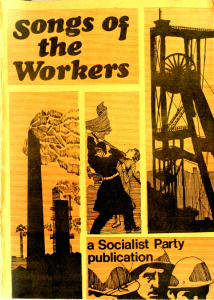
Songs of the Workers (1975)
Socialist Party of Ireland [1970]
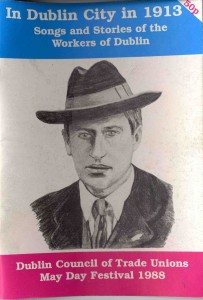
In Dublin City in 1913: Songs and Stories of the Workers of Dublin (1988)
Dublin Council of Trade Unions
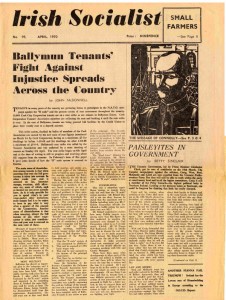
Irish Socialist, No. 95 (1970)
Communist Party of Ireland
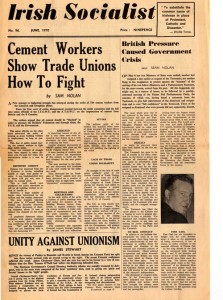
Irish Socialist, No. 96 (1970)
Communist Party of Ireland
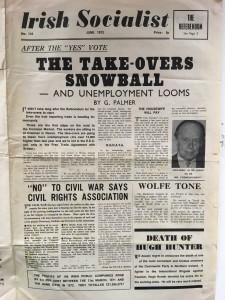
Irish Socialist, No. 116 (1972)
Communist Party of Ireland
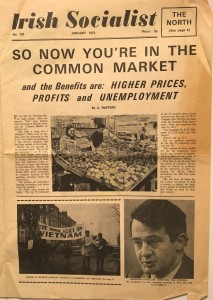
Irish Socialist, No. 123 (1973)
Communist Party of Ireland
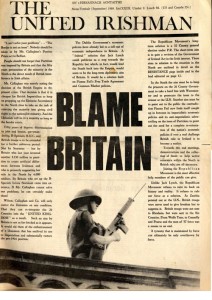
The United Irishman, Vol. 23, No. 9 (1969)
Sinn Féin [Pre 1970]
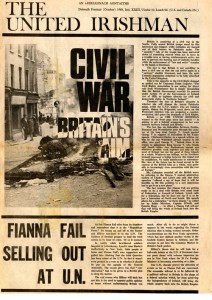
The United Irishman, Vol. 23, No. 10 (1969)
Sinn Féin [Pre 1970]
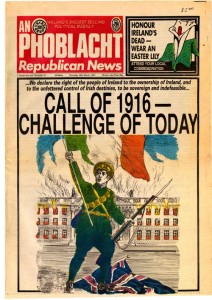
An Phoblacht Republican News, Iml. 13, Uimh. 13 (1991)
Sinn Féin
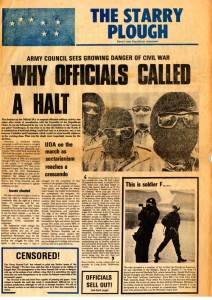
The Starry Plough (1973)
Sinn Féin [Official]
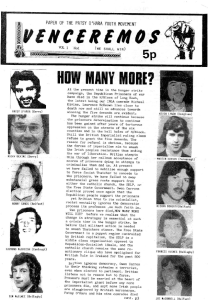
Venceremos, Vol. 1, No. 1 (1981)
Patsy O'Hara Youth Movement
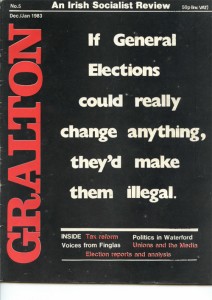
Gralton, No. 5 (1983)
About this Collection
This collection brings together some of the musical content in the archive, including specific song books as well as songs within the various magazines and papers featured. The political use of music has a wide and varied history - from deliberate use in the inculcation of national sentiment in many nation-building projects of the twentieth century, to its use as a means of resistance and expression of dissent. What is recognised in each is that music has capacity not just to reflect and describe, but also to reinforce or challenge social and political situations. It is no surprise then that many of the publications in the archive draw on political music.
Much of the music available in the archive can broadly be described as ‘folk’ music. Without considering here the usefulness of the term in any musical typology (when does a popular song become folk, or vice versa?), folk music has a unique status of being perceived as music that belongs to the people (regardless of whether ‘the people’ may in fact have more familiarity with the popular music of the day), which makes it natural material for politicisation.
Of course, this is also likely to reflect the time period in which much of the material in the archive was published, when the folk revival was often linked to political and social movements of the Left. (It is notable, for example, that one of the major music publishers of the British folk revival, Topic Records , was originally founded by the Communist Party of Great Britain).
It is perhaps useful to distinguish overtly political ballads from those that are politicised. A song such as ‘The Red Flag’ is fairly unambiguous in its political message, and would be difficult to appropriate to an entirely new politics, whereas an older, traditional song may lend itself more easily to alternative political readings, or politicisation by association.
There are two song books in the archive, Songs of the Workers from the Socialist Party of Ireland and In Dublin City in 1913: Songs and Stories of the Workers of Dublin, published by The Dublin Council of Trade Unions to mark the 75th anniversary of the 1913 lockout. There is considerable overlap between the songs in both documents. Perhaps unsurprisingly, they both include ‘The Internationale’ and ‘The Red Flag’, for example. (For more on the latter, see Helena Sheehan’s site - including recordings with the originally intended ‘White Cockade’ melody). Both also include Patrick Galvin’s ‘James Connolly’.
In total, of the thirteen (appropriately) songs in In Dublin City in 1913, seven also appear in the SPI publication. These are notable for their international character, despite the title of the booklet, and also demonstrate how songs arising from a particular event such as ‘Joe Hill’ can come to be used as symbols in a broader political context. Songs such as ‘Joe Hill’ and ‘Bandeira Rossa’ (‘Avanti Popoli’) clearly position the collection in an international workers’ context. Songs of the Workers provides the texts and a brief explanatory note for a wide range of songs. Again, they draw from America and Britain as well as presenting Irish songs such as ‘James Connolly’ and Connolly’s ‘The Blackleg’ and ‘Be Moderate’.
In addition to these song books, a number of the magazines and publications in the archive feature music-related content. The Irish Socialist had a regular column from 1968 to 1975 by John McDonnell entitled ‘Ballad Corner’, which provided the lyrics and (generally) an accompanying commentary. McDonnell was a CPI member who left with the Irish Marxist Society in 1976, ultimately joining the Labour Party1. The ‘Ballad Corner’ column has been described as the genesis of his book, Songs of Struggle and Protest, published in 1979. In the introduction to the 2008 reprint of the book, Francis Devine says of the Ballad Corner column:
Researching songs was not easy for a contract electrician with a young family. Accessing the National Library of Ireland and Trinity College, Dublin proved difficult. On occasion, a half day off work was unrewarded as material failed to arrive at his desk before it was time to return to work or the library closed. McDonnell’s book was a triumph over adversity for a worker historian in all the best senses of the term. […] McDonnell’s doggedness was borne as much out of political commitment to the task in hand as to his own indefatigable personality. Frank Harte believed that songs were a key to understanding the past. He often observed, “those in power write the history, those who suffer write the songs”. McDonnell believed this too and attempted to recover workers’ history through song. ‘Ballad Corner’ gave the social context and provenance of songs, McDonnell’s work often being the first to provide such a detail for songs, be they well-known or obscure. Francis Devine, 2008. Introduction, in John McDonnell, Songs of Struggle and Protest, Irish Labour History Society
Examples of this column in the archive provide the text of “The Cutty Wren” (Irish Socialist, No. 96, p. 2), “Preab San Ól” (Irish Socialist, No. 95, p. 2), and “Jim Larkin RIP” (Irish Socialist, No. 123, p. 2). The June 1972 column gives us two more contemporaneous songs: “Big Joe”, an adaptation of “Joe Hill” dedicated to Joe McCann, who died a few months previously; and as “A New Song Against the E.E.C.” to the tune of Boolavogue (in light of the then recent membership referendum) (Irish Socialist, No. 116, p. 2).
The United Irishman provides another example of a regular music page in “The Rebel Ballad Sheet” in the 1969 editions in the archive, and a couple of example editions are included in this collection. The emphasis in these is entirely on rebel songs. For example, The Rebel Ballad Sheet from September 1969 includes Dominic Behan’s “The Patriot Game” and the Seán South ballad.
Similarly, it is not unexpected to see an emphasis on Irish and Republican songs, as opposed to the above International socialist emphasis, in An Phoblacht’s choice of songs for the 75th anniversary of the 1916 Rising (An Phoblacht/Republican News, Vol. 13: No. 13), which include Amhrán na bhFiann with an accompanying history of the song (and an admission of favouring “sine Laochra Fáil” rather than the more common “sine Fianna Fáil” to dissociate from the party of that name). Patrick Galvin’s ‘James Connolly’ makes another appearance here also.
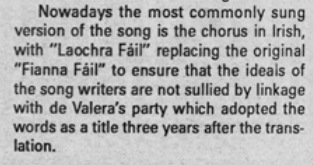
A couple of other song appearances are included in this collection: The Socialist Republic, by Tony Doherty in The Starry Plough; Venceremos 2 in the eponymous publication from the Patsy O’ Hara Youth Movement.
There seem to be no publications that have included written music as well as the words of songs in the archive. Most of those discussed make no mention of the tune, although the “Rebel Ballad Sheet” pages, like the historical broadsides, put “to the tune of” some well known tune above the text. This is of course fairly typical of the folk or ballad tradition.
An article by Brian Trench in Gralton magazine on a series of fund-raising gigs for the Anti-Amendment Campaign (opposed to the anti-abortion amendment to the constitution) also demonstrates a practical value of music to Left campaigns. The characterisation of genres in the article is also interesting. Support from the campaign came from “rock and folk” musicians, and not from country music, which Trench describes as “profoundly reactionary”.
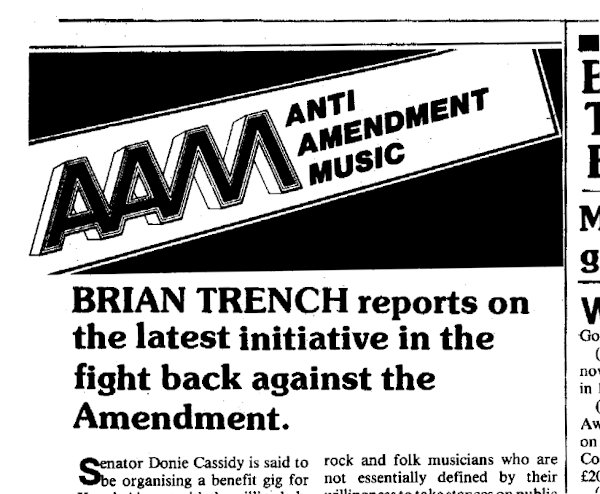
The usefulness of music as a means of spreading a political message has been evident in politics of all hues, and although the Left orientation of the archive materials means there is a tendency to music of resistance, it is of course equally capable of functioning as a reinforcement of the status quo. (Even the same song can have its meaning challenged to serve both purposes, as is perhaps hinted at in the above use of ‘Amhrán na bhFiann’ ).
Hopefully this sample draws attention to some of the ways music has featured in the Irish Left. The collection doesn’t purport to being exhaustive, and there are no doubt a few more stray songs in various publications in the archive, so if readers spot any of interest do let us know in the comments.
-
McDonnell was also involved in the visit of miners’ families to Tallaght, documented in the British Miners’ Strike 1984/85 collection. And note from the agenda of events there that the entertainment included an evening at the Workers’ Music Co-operative Club. ↩
-
This is not the same as the popular Chilean song entitled Venceremos. If anyone is familiar with it, let us know. ↩
Documents
- 1975 — Songs of the Workers Socialist Party of Ireland [1970]
- 1988 — In Dublin City in 1913: Songs and Stories of the Workers of Dublin Dublin Council of Trade Unions
- 1970 — Irish Socialist, No. 95 Communist Party of Ireland
- 1970 — Irish Socialist, No. 96 Communist Party of Ireland
- 1972 — Irish Socialist, No. 116 Communist Party of Ireland
- 1973 — Irish Socialist, No. 123 Communist Party of Ireland
- 1969 — The United Irishman, Vol. 23, No. 9 Sinn Féin [Pre 1970]
- 1969 — The United Irishman, Vol. 23, No. 10 Sinn Féin [Pre 1970]
- 1991 — An Phoblacht Republican News, Iml. 13, Uimh. 13 Sinn Féin
- 1973 — The Starry Plough Sinn Féin [Official]
- 1981 — Venceremos, Vol. 1, No. 1 Patsy O'Hara Youth Movement
- 1983 — Gralton, No. 5
Comments 1
Music from the USSR
By: Aonrud | 2nd February 2015, 6:53pm
Since the above focuses on folk music, it's worth noting as well the advertisements for "Music from the USSR" on the inside cover of some of the issues of Making Sense in the archive, offering various classical composers and distributed by Repsol (publishing imprint of the Workers' Party). See here for example: http://www.clririshleftarchive.org/document/view/575/?page=2
Add a Comment
Comments can be formatted in Markdown format . Use the toolbar to apply the correct syntax to your comment. The basic formats are:
**Bold text**
Bold text
_Italic text_
Italic text
[A link](http://www.example.com)
A link